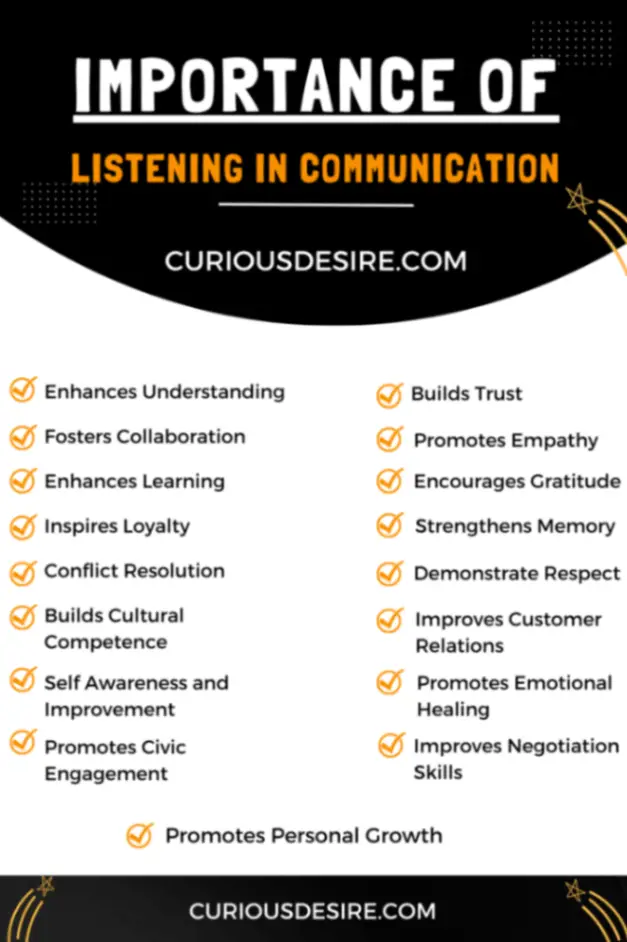Are you a good listener? Listening is a fundamental aspect of communication that is often overlooked in our fast-paced world.
Effective communication is a two-way street, and listening is a key component to ensure that the message is received accurately and completely.
It goes beyond just hearing the words spoken; it involves actively paying attention, processing the information, and responding appropriately.
Listening plays a crucial role in fostering understanding, building relationships, and promoting successful interactions.
In this blog, we’ll delve into the importance of listening in communication and explore how mastering this skill can lead to richer relationships, enhanced understanding, and greater success.
5 most common reasons for the importance of listening in communication:
- Enhances Understanding
- Builds Trust
- Strengthens Leadership Skills
- Improves Negotiation Skills
- Demonstrates Respect

1. Enhances Understanding
Listening is more than just passively hearing words; it involves active engagement with the speaker’s message.
When we truly listen, we not only grasp the content of what is being said but also understand the underlying emotions, intentions, and context.
This deep understanding goes beyond surface-level comprehension, allowing us to empathize with the speaker’s perspective and connect on a deeper level.
Through attentive listening, we gain insights into the speaker’s motivations, concerns, and needs, cultivating empathy and strengthening relationships.
2. Builds Trust and Rapport
Trust is the foundation of any meaningful relationship, and listening is a fundamental building block of trust.
When we listen attentively to others, we signal that their thoughts, feelings, and opinions are valued and respected.
This validation fosters a sense of trust and rapport, creating a safe and supportive environment for open communication.
By demonstrating empathy and understanding through active listening, we establish strong bonds with others, paving the way for authentic connections and mutual respect.
3. Prevents Misunderstandings
Misunderstandings often arise when communication is unclear or misinterpreted.
Active listening serves as a safeguard against such misunderstandings by ensuring that messages are received and understood accurately.
By paying attention to both verbal and nonverbal cues, clarifying points of confusion, and paraphrasing to confirm understanding, we minimize the risk of miscommunication.
Effective listening promotes clarity and precision in communication, reducing the likelihood of conflicts or confusion.
4. Fosters Collaboration
In collaborative settings, effective communication is essential for success, and listening plays a pivotal role in fostering collaboration.
By listening attentively to the perspectives, ideas, and contributions of others, we create an inclusive environment where everyone feels heard and valued.
This sense of inclusivity encourages active participation and engagement, leading to greater synergy and productivity.
Moreover, active listening promotes creativity and innovation, as diverse viewpoints are acknowledged and integrated, leading to more robust solutions and outcomes.
5. Promotes Conflict Resolution
Effective listening is a cornerstone of resolving conflicts peacefully and constructively.
- Promotes Understanding: Effective conflict resolution begins with understanding the perspectives, concerns, and emotions of all parties involved. Listening plays a pivotal role in this process by providing a platform for each party to express themselves fully.
- Encourages Empathy: Listening with empathy is essential for navigating conflicts with sensitivity and understanding. When we listen attentively to the emotions underlying others’ words, we connect on a deeper level and acknowledge their feelings.
- Identifies Root Causes: Conflict resolution requires addressing the underlying issues and root causes of disagreement. Through active listening, we can uncover the underlying needs, fears, and motivations driving the conflict.
Active listening plays a pivotal role in resolving conflicts and disputes.
6. Demonstrates Empathy
Listening is a powerful way to demonstrate empathy and understanding towards others.
When we listen attentively, we not only hear the words being spoken but also empathize with the emotions, experiences, and perspectives behind them.
By acknowledging and validating others’ feelings through active listening, we show that we care about their well-being and are invested in their concerns.
This builds trust, strengthens relationships, and cultivates a sense of connection and support.
7. Improves Decision-Making
Listening plays a crucial role in informed decision-making by providing valuable insights and perspectives.
When we actively listen to diverse viewpoints and opinions, we gain a more comprehensive understanding of the situation at hand.
This broadened perspective enables us to consider different options, anticipate potential consequences, and make more informed and effective decisions.
Involving others in the decision-making process through active listening breeds a sense of ownership and commitment, increasing the likelihood of successful outcomes.
8. Enhances Learning
Listening is a fundamental aspect of learning and knowledge acquisition.
By listening attentively to instructors, mentors, or peers, we absorb new information, ideas, and perspectives.
Active listening allows us to engage deeply with the material being presented, ask questions, and seek clarification when needed
Listening to feedback and constructive criticism enables us to identify areas for improvement and grow personally and professionally.
By embracing listening as a lifelong learning tool, we continuously expand our knowledge, skills, and understanding of the world around us.

9. Strengthens Leadership Skills
As a leader, actively listening to your team members demonstrates that you value their input and perspective.
Effective leaders understand that they don’t have all the answers. By listening to diverse viewpoints and considering various perspectives, leaders can make more informed and well-rounded decisions.
When leaders listen attentively to the needs and concerns of their team members, it fosters a sense of loyalty and commitment. Team members are more likely to go above and beyond for a leader who listens to and respects them.
By creating an environment where everyone’s ideas are heard and valued, leaders can build a culture of innovation and teamwork.
10. Promotes Personal Growth
Listening to others can provide valuable insights into our behaviors, beliefs, and biases.
By actively listening to feedback and differing perspectives, we can gain a deeper understanding of ourselves and our impact on others.
Actively seeking out diverse viewpoints and opinions through listening can broaden our horizons and expand our perspectives.
Effective listening is essential for building and maintaining meaningful relationships. By listening attentively to friends, family members, and colleagues, we can deepen our connections and develop a greater sense of intimacy and understanding.
By tuning into others’ emotions and responding empathetically, we can strengthen our emotional intelligence and enhance our interpersonal skills.
11. Improves Negotiation Skills
In negotiations, listening acts as the compass guiding negotiators through the maze of conflicting interests and priorities.
By listening attentively to the concerns, needs, and underlying motivations of all parties involved, negotiators can navigate toward mutually beneficial outcomes.
Active listening allows negotiators to identify areas of common ground, anticipate potential obstacles, and craft creative solutions that address the interests of all stakeholders.
By demonstrating empathy and understanding through listening, negotiators build trust and rapport, laying the foundation for successful negotiation outcomes.
12. Strengthens Networking
Networking thrives on meaningful connections forged through genuine interactions, and listening is the key to unlocking its potential.
By listening attentively to the experiences, perspectives, and aspirations of others, you can build strong and lasting relationships within your professional networks.
Active listening enables you to understand the needs and goals of your contacts, identify opportunities for collaboration, and offer support and assistance where needed.
By cultivating a reputation as a good listener, you enhance your credibility and trustworthiness within your networks, opening doors to new opportunities and partnerships.
13. Promotes Civic Engagement
In the realm of civic engagement, listening serves as the cornerstone of effective democracy and community participation.
Active listening fosters inclusivity and empowers marginalized voices, ensuring that diverse perspectives are heard and valued in decision-making processes.
Moreover, by fostering constructive dialogue and collaboration through listening, civic engagement initiatives can inspire collective action and drive positive change in society.
14. Encourages Gratitude
Gratitude is a powerful force that strengthens relationships and creates a sense of well-being and belonging.
Listening plays a crucial role in cultivating gratitude by allowing you to acknowledge and appreciate the contributions of others.
Through attentive listening, you can express genuine gratitude for the support, kindness, and generosity they receive from others.
This act of listening and expressing gratitude strengthens relationships, develops mutual respect, and appreciation, and creates a culture of positivity and reciprocity.
15. Inspires Loyalty
Listening attentively to others fosters a sense of validation and respect, which in turn inspires loyalty.
When you feel heard and understood, you are more likely to develop a deep sense of loyalty toward those who listen to you.
In personal relationships, friends and family members who actively listen to each other build trust and loyalty, creating strong bonds that withstand the test of time.
Similarly, in the workplace, employees who feel valued and appreciated for their ideas and opinions are more likely to remain loyal to their employers, leading to higher levels of engagement and productivity.
16. Promotes Emotional Healing
Listening with empathy can be a powerful tool for promoting emotional healing.
When you feel heard and validated in your experiences, it can provide a sense of relief and validation.
In therapeutic settings, active listening from counselors or therapists can help you process and make sense of your emotions, leading to greater emotional resilience and healing.
In personal relationships, friends and loved ones who listen empathetically can offer comfort and support during difficult times, facilitating the healing process.
17. Improves Customer Relations
In customer service and business settings, listening plays a crucial role in building positive relationships with clients and customers.
By actively listening to customer feedback, concerns, and suggestions, businesses can demonstrate that they value their customers’ opinions and are committed to addressing their needs.
This enhances trust and loyalty among customers and leads to increased satisfaction and repeat business.
By listening to customer complaints and resolving issues promptly and effectively, businesses can turn potentially negative experiences into positive ones, further enhancing customer relations.

18. Strengthens Memory
Listening actively engages the brain and can strengthen memory and cognitive function.
When you listen attentively to information, whether in conversations, lectures, or presentations, you are more likely to retain and recall that information later.
By actively processing and engaging with what they hear, you can strengthen neural pathways associated with memory formation and retrieval.
Moreover, by practicing active listening techniques such as summarizing and paraphrasing, you can reinforce your understanding and retention of information.
19. Demonstrates Respect
When you listen attentively, you show respect by giving the speaker your full attention.
This demonstrates that you consider their thoughts and feelings important enough to warrant your complete focus, regardless of any distractions.
Through empathetic listening, you validate others’ emotions and experiences, showing that you respect their feelings and understand their point of view.
Respecting others’ perspectives means refraining from interrupting or prematurely forming judgments. By allowing others to express themselves fully without interruption, you show that you value their right to be heard and understood
20. Builds Cultural Competence
Actively listening to people from different cultural backgrounds allows you to gain insights into their unique perspectives, beliefs, and values.
- Recognizing Cultural Nuances: Cultures vary in their communication styles, norms, and customs. By listening attentively, you can pick up on subtle cues and nuances specific to different cultures, allowing you to communicate more effectively and respectfully across cultural boundaries.
- Avoiding Assumptions and Stereotypes: Listening helps you avoid making assumptions or relying on stereotypes about individuals based on their cultural background. By approaching interactions with an open mind and actively listening to each person’s unique experiences, you can avoid cultural misunderstandings.
- Adapting Communication Styles: Effective cross-cultural communication requires the ability to adapt your communication style to accommodate cultural differences. Through listening and observing, you can tailor your communication approach to align with the preferences and expectations of individuals from diverse cultural backgrounds.
Practical Tips to Become Better Listeners
So how can we become better listeners in our daily interactions? Here are some practical tips:
1. Be Present
Practice being fully present and engaged when someone is speaking to you.
Avoid distractions, such as checking your phone or thinking about your response, and focus on the speaker.
2. Show Empathy
Put yourself in the speaker’s shoes and try to understand their perspective and emotions.
Show empathy through your body language, facial expressions, and verbal cues.
3. Ask Clarifying Questions
If you are unsure about something the speaker said, ask clarifying questions to ensure you have fully understood their message.
4. Avoid Interrupting
Allow the speaker to finish their thoughts before responding. Interrupting can signal impatience or a lack of respect for the speaker’s perspective.
5. Practice Active Listening
Engage with the speaker by nodding, making eye contact, and providing feedback to show that you are actively listening and processing their message.
Conclusion
The importance of listening in communication cannot be overstated.
True communication is a dynamic process that involves both speaking and listening, with each playing a crucial role in creating meaningful interactions.
By honing our listening skills, we can deepen our understanding of others, build strong connections, and achieve greater success in all areas of our lives.
So let’s remember to listen attentively, empathetically, and actively in our conversations, and watch as our communication skills and relationships flourish.